- Home
- Patrick Ness
Tip Of The Tongue
Tip Of The Tongue Read online
TIP OF THE TONGUE
Patrick Ness
PUFFIN
Contents
About Patrick Ness
Books by Patrick Ness
TIP OF THE TONGUE
About Patrick Ness
Born in Virginia, USA, Patrick Ness spent his upbringing in the states of Hawaii, Washington and California before moving permanently to the UK. He is the author of the Chaos Walking trilogy: The Knife of Never Letting Go, The Ask and the Answer and Monsters of Men, which established him as one of the most original and exciting writers of today. The trilogy has won many awards including the Guardian Children’s Fiction Prize, the Costa Children’s Book Award, the Booktrust Teenage Prize and the CILIP Carnegie Medal. Following a major rights deal with US studio Lionsgate (makers of blockbuster The Hunger Games) the first film is currently being written by Oscar-winning screenwriter Charlie Kaufman (Being John Malkovich, Eternal Sunshine of the Spotless Mind).
Patrick’s sixth book, A Monster Calls, received high critical acclaim and is the winner of the Children’s Book of the Year Award at the Galaxy National Book Awards, the Red House Children’s Book Award and the UKLA Children’s Book Prize. In June 2012, A Monster Calls became the first book ever to win both prestigious CILIP Carnegie and Kate Greenaway Medals.
His highly anticipated new novel for adults, The Crane Wife, was inspired by a Japanese folk tale and published by Canongate in April 2013.
A daring new YA novel, More Than This, is forthcoming later this year from Walker (Candlewick in the US).
Patrick’s earlier works include the adult novel The Crash of Hennington, short-story collection Topics About Which I Know Nothing, varied journalism and radio plays. He was Booktrust’s first ever writer in residency and has taught creative writing.
Books by Patrick Ness
The Crane Wife
A Monster Calls
Monsters of Men
The Ask and the Answer
The Knife of Never Letting Go
Topics About Which I Know Nothing
The Crash of Hennington
Tip of the Tongue
‘Is it broken?’ Jonny asked, frowning.
Nettie’s face looked like she was ready for this. ‘It can’t break,’ she said. ‘It’s alive. Or something.’
‘Well, sick, then.’
‘It’s fine. Look, do you want it or not?’
Jonny again felt the money he had wrapped in a tight roll in his pocket. Two dollars. A king’s ransom, almost six months of saving the nickel tips he got from his job as a busboy at Mr Finnegan’s diner. He gave the bulk of his wages to his mother, of course; they needed every penny now that his dad was overseas fighting this war against Hitler.
But Nettie’s family needed the money, too (went the argument Jonny had rehearsed a dozen times in his head for the inevitable moment his mother blew her top when she found out how much money he was about to spend). Nettie’s dad had died just after she was born, but while Jonny’s mother could find good war work at Temperance’s local factory making shells for tanks, Nettie’s mother couldn’t. Nettie’s mother was black, and even though this was Maine and not the deep south, Mr Acklin, the factory owner, had found ways to keep Nettie’s mother out of a job. She was supporting herself and Nettie on a cleaner’s salary that could barely keep Nettie in school clothes.
Jonny’s mother knew this. She and Nettie’s mother had been friends ever since Jonny and Nettie had met as five-year-olds at the town’s one public school, their moms quickly coming together in the way that outcasts sometimes do. The mother of the town’s only mixed-race girl and the Jewish mother of the small boy with the German last name.
She’ll understand, Jonny thought, rolling the money between his fingers. Won’t she?
‘You’re sure it’ll work?’ Jonny said.
Nettie sighed, sounding twenty years older than her own fourteen. ‘It worked for Uncle Paul,’ she said.
‘He’ll get mad that you sold it –’
‘He’s on a tropical island by Australia somewhere shooting at people in swamps.’
Nettie’s young uncle had rented a room from her mother before he’d shipped out. There was a harsh anxiety in Nettie’s voice that she wasn’t altogether successful in disguising. ‘He’s got other things to worry about.’
Jonny was still hesitant. Nettie gave an exasperated tut. ‘Try it!’ she practically shouted. ‘If it doesn’t work, you don’t have to buy it. We can forget the whole thing.’
‘OK,’ Jonny finally said, holding out his hand. Nettie placed the Truth Teller in his palm. It stared up at him balefully, its yellow eyes full of weary sadness. ‘It looks depressed.’
‘If it was a machine, I’d fix it,’ Nettie said, impatiently. Which was true. She could fix nearly anything. Jonny’s bike several times, a door at his house that had never hung properly. Her Uncle Paul had been great with his hands and a worshipful Nettie had mooned around him for years like the world’s most devoted younger sister, almost accidentally learning how to repair toasters and change the oil in a Studebaker. ‘All I can tell you is that Paul said it worked.’
Jonny gently poked the small frown in his hand. It said nothing, but gave him a look of unsurprised hurt feelings.
He blew out a long breath. The Truth Teller was real. It was the closest he was ever going to get to being able to buy one. It could be his for two dollars.
And it might finally, finally, get Marisa Channing to notice him.
He turned it over, opened the two prongs at the back and unfurled the long body. He’d never worn one and wasn’t exactly sure how it was supposed to fit, but there were only so many ways it could go. He opened his mouth, put the two prongs on either side of his tongue, and rolled the body down over his chin and under his neck, draping it there like his face was wearing a tie.
‘How’s it look?’ he asked, his tongue tripping a little over the prongs.
Nettie crossed her arms. ‘Don’t ask me. I hate those things. I don’t approve of this transaction at all, remember?’
‘I remember,’ he said. ‘How do you get it to say anything?’
‘It should –’ she said, reaching forward.
‘I like you only as a friend,’ the Truth Teller said, its eyes looking directly from Jonny’s chin into Nettie’s face.
She frowned. ‘It works.’
After the two dollars was handed over and a bewildered but nervously happy Jonny went one way back to his job at the diner and a richer but somehow still irritated Nettie went the other way back to her job at Mr Bacon’s gas station, a blond man dressed in what seemed to be a cricketing uniform with what seemed to be a stalk of celery on his lapel, stepped out of what seemed to be absolutely nowhere with a thoughtful look on his face.
But surely none of that could be possible.
‘Surely none of this can be possible,’ he said, almost cheerfully.
‘None of what?’ said a woman with long, curly hair, stepping out of the nothingness behind him. ‘They seemed like nice enough children.’
‘Yes, Nyssa,’ the man said. ‘But this is Earth, 1945.’ He took in a deep breath. There was sea salt in the air. ‘Maine, if I’m not mistaken.’
‘And?’
‘And the Dipthodat aren’t supposed to arrive here for at least a hundred years. They should still be halfway across the galaxy at this point in the timeline.’
‘So what are they doing here now, Doctor?’
‘What, indeed, Nyssa?’ the Doctor said, putting his hands in his pockets. ‘That sounds like a question that needs answering.’
The fad had started just before summer, which made it awkward at first. There was no school to go to each day to check on what kinds of Truth Teller everyone else was wearing or
what attitudes they were taking towards them or, most importantly, how fashionable they properly were. Plus, it was wartime: if you were more than twelve (and sometimes not even that), you had a summer job to go to, labouring on farms, working in local shops, even a few kids older than Jonny or Nettie taking up summer shifts in the weapons factory for Mr Acklin.
It was, in fact, Mr Acklin’s daughter Annabelle who had shown up three days before the end of the school year, a dark blue Truth Teller mounted on her chin like one of those busty ladies on the fronts of pirate ships. Her father didn’t just own the factory, he also owned Temperance’s general store, which her mother ran, and so Annabelle was the first with every fashion that migrated its way up from the big cities to the south, from where, incidentally, the whole Acklin family had moved five years earlier and visited regularly, so she came with an inbuilt authority no other girl in Temperance could ever hope to match. She’d worn the first knee-length (instead of mid-calf) skirt the school had ever seen and was promptly sent home for it, though overnight every other girl in school had hemmed her own skirt right up to the knee and Principal Marshall, swamped with what he called ‘an outbreak akin to the Bolshevik revolution’, gave in. Annabelle was also the first to wear a real fur collar on both her winter and summer coats – coney, but dyed to look like mink, because ‘There’s a war on, you know,’ she said – and the first to use make-up on her legs in place of stockings after the Japanese cut off the supply of silk to America. Not that any other girl in town could have afforded silk stockings anyway, but Annabelle’s powdered legs led to a full week of school-wide stains at ankle level until the principal finally did put his foot down.
‘What on earth is that thing on your face, Miss Acklin?’ he said on the first day of the Truth Tellers, as always looking like he was only just fighting off a heart attack.
Annabelle raised her head proudly. She hadn’t even made it to the front doors of the school, and the rest of the school population – including, Jonny saw, Marisa Channing – had its eye on her. ‘What?’ Annabelle said, affecting a what’s-the-big-deal air and implying that any shock was entirely someone else’s problem. ‘This old thing?’
Principal Marshall’s mouth opened and closed a few times as disbelief fought outrage and lost. ‘Take it off this instant!’
And then it spoke.
The thing on her jaw opened its toothy mouth – edged just where the point of Annabelle’s chin fell – and a gentle, sad voice, which put Jonny immediately in mind of a sorrowful cow, rang out, quiet but in a strange, impossible way that carried to every eagerly listening ear.
‘You are a bald man,’ the voice said, ‘and your wife is not visiting her sister in Boca Raton. She ran off with Mr Edmundsen at the bakery. Everyone knows this, yes.’
‘You could have heard a mosquito burp,’ Nettie said later of the silence that followed, and indeed you could have. Principal Marshall’s face grew redder and redder until he finally shouted, ‘How dare you!’
‘It’s only the truth,’ Annabelle said, eyes bright. ‘How can you punish anyone for the truth?’
Speechless, Principal Marshall’s eyes opened wide and unfortunately that allowed a moment for everyone to reflect that, yes, Principal Marshall was, in fact, a bald man and it was widely known that Mrs Marshall had been the bakery’s most enthusiastic customer before it mysteriously shut and she left for her sisterly ‘visit’ shortly thereafter.
Annabelle was suspended, of course, sent home immediately pending further disciplinary action, but not before telling everyone how there was a stock of Truth Tellers in her mother’s shop for anyone who might be interested in buying one.
Further disciplinary actions never materialized. Annabelle’s parents were the richest, most powerful, and frankly scariest people in town, and though no one actually liked Mr Acklin (How could you? The smarm, the big-city arrogance, the way he threw his money around, including tearing down the town’s one big mansion to build a new one in its place. In wartime!), no one could afford to oppose him either. Although the Truth Tellers were never officially allowed on school grounds, that didn’t stop crowds of people, young and old, man and woman, anyone who could afford them, really, and often even those who couldn’t, from buying them in their droves.
‘Your posterior is demonstrably too wide for that dress,’ Jonny would hear from the sidewalk as he emptied the rubbish from the diner. The woman whose posterior was in question would turn around in horrified anger, but the man behind her would already be shrugging with a smirk not masked by the Truth Teller draped over his chin. ‘These pesky things,’ he’d say. ‘Can’t argue with the truth, huh?’
At which point the woman’s own Truth Teller would say, ‘Your breath has always smelled like that of a person long dead. And no one believes your excuse of flat feet for not enlisting with the rest of our brave soldiers.’
Both parties would leave angry and frustrated and somehow even more ready to inflict truth on somebody else.
Within two weeks of the sale of the first Truth Teller, Temperance’s small jail was full to bursting with minor assault cases, some between people who had up until that moment been lifelong friends. Its small courthouse was hearing filing after filing of new divorces from couples who had otherwise been happy since before the Great Depression. The town’s ineffective council begged Mr Acklin to stop selling the ‘damned things’ but he said there was no reason to, as it was, after all, ‘just a passing fancy. We’ll all move on to the next thing soon enough. For instance, have you heard of this thing called a hula hoop? Just a dollar ninety-nine down at the shop …’
But like many fads misunderstood by the aged – i.e. anyone over the age of twenty – the Truth Tellers found a secondary, but thriving underground market in the school-age population of Temperance. As mothers and fathers returned the Truth Tellers to the shop at great speed (for no refund, of course), an unofficial subculture developed. At the Horizon, Temperance’s only movie palace, hordes of matinee youths would gather in their seats, wait for the lights to go down, and then quietly slip on the Truth Tellers abandoned by their older relatives or, in rarer cases, bought second-hand with their own money under the counter in Mrs Acklin’s shop, never a woman to turn a blind eye when there was cash to be made.
Hardly anyone would be watching the newsreel as a Truth Session, as they came to be known, started in the first five rows of the balcony.
‘Troy Davis likes you but not as much as you think he does, nor in the manner in which you would wish.’
‘You think your hair looks like the cinematic star Veronica Lake while everyone else comments behind your back on its resemblance to a horse’s mane. This is not said in any way that might be taken as a compliment.’
‘You are too selfish and loud and the spirits of your friends fall when you walk into a room.’
‘Troy Davis’s story about getting Debbie Madison in the family way so that she had to move is a lie.’
‘You have a faint odour that people discuss behind your back.’
‘Everyone knows your father is a drunk.’
‘Your thighs are just as fat as you think they are.’
‘You, Troy Davis, are saving your affections for another member of your basketball team in a way that would not be widely accepted by the societal attitudes of this time period and location.’
The Truth Sessions were spearheaded by Annabelle Acklin, of course, who would choose whoever that day’s victim might be. Well, not her, exactly, it was completely out of her hands, wasn’t it? It was the Truth Teller who had all the truths to tell, and truth, after all, could neither be denied nor hidden nor defended against. And if sometimes after the Session, people withdrew from their social circle or decided to sit forever in another part of the classroom or even – like when Troy Davis lied about his age to enlist and was immediately shipped overseas – people left altogether, then perhaps Temperance could do without them, no?
Jonny had never been to a Truth Session. Not high enough up the scho
ol food chain. Plus, too short, too foreign-seeming – with that last name that hung on him like a sack of wheat – he was, frankly, too invisible to have even registered on the radar of someone like Annabelle Acklin.
That would change, though. Oh, yes, that was about to change.
Because Jonny knew that Marisa went to Truth Sessions, though he didn’t think she’d ever been the focus of one, just contributed with the pearly pink Truth Teller her father had bought her for her birthday.
Beautiful, tall, elegant Marisa. With her one stray freckle and her flowing blonde hair and her otherworldliness that made her seem like an angel.
All words Jonny would have rather died than say out loud.
Still, wouldn’t she be surprised when Jonny showed up in the balcony with a Truth Teller of his very own?
‘This old thing?’ he’d say.
He wouldn’t say he’d bought it used from Nettie.
(For her part, Nettie had never been within a mile of a Truth Session and he knew she wouldn’t have gone even if invited by Annabelle Acklin herself.
Sometimes he didn’t understand Nettie at all.)
‘The strangest thing happened today,’ his mother said, hanging her coat on the hook in the kitchen. Jonny was peeling the two potatoes they would have for an early dinner before he went off to his evening shift at Mr Finnegan’s Diner. His mother always came in from the factory smelling strongly of iron and oil, and by the time she’d washed – with the water he’d warmed for her on the stove – dinner would be ready. They’d eat, Jonny would go back to work and his mother would start the sewing she did for extra cash. Sometimes Nettie’s mom would come over, too, and more than once he’d returned home to find them in their separate chairs, cups of ‘war coffee’ on the table between them, both completely asleep, sewing half-done in their laps.
‘What strange thing?’ Jonny asked, when she didn’t continue. He sliced the second potato and dropped it into the boiling water.

 The Rest of Us Just Live Here
The Rest of Us Just Live Here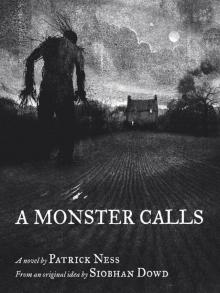 A Monster Calls
A Monster Calls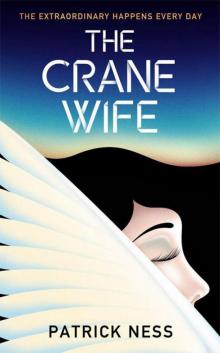 The Crane Wife
The Crane Wife Release
Release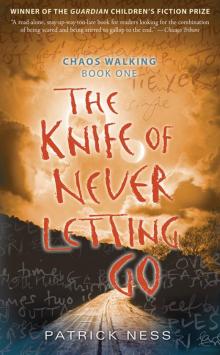 The Knife of Never Letting Go
The Knife of Never Letting Go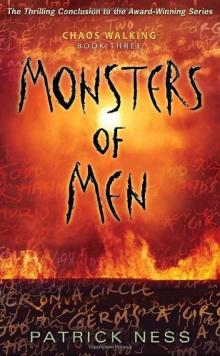 Monsters of Men
Monsters of Men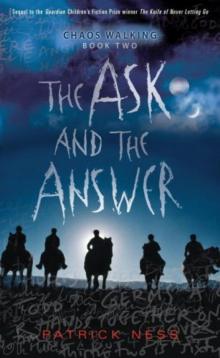 The Ask and the Answer
The Ask and the Answer The New World
The New World More Than This
More Than This Burn
Burn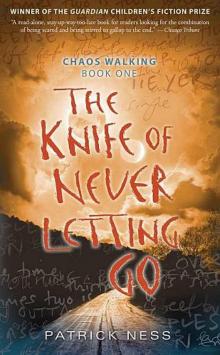 The Knife of Never Letting Go cw-1
The Knife of Never Letting Go cw-1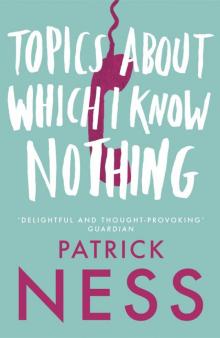 Topics About Which I Know Nothing
Topics About Which I Know Nothing And The Ocean Was Our Sky
And The Ocean Was Our Sky The Stone House
The Stone House The Crash of Hennington
The Crash of Hennington Joyride
Joyride What She Does Next Will Astound You
What She Does Next Will Astound You Tip Of The Tongue
Tip Of The Tongue Chaos Walking
Chaos Walking